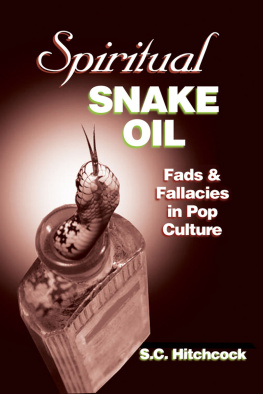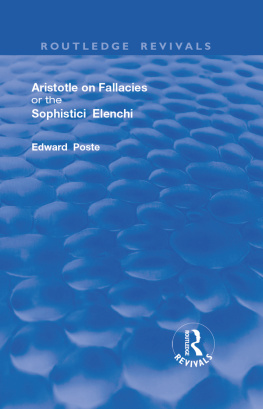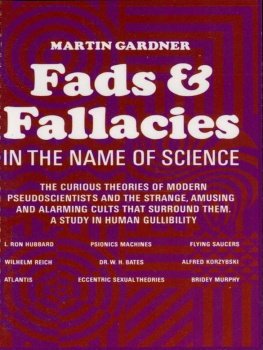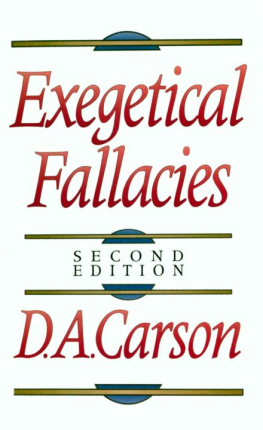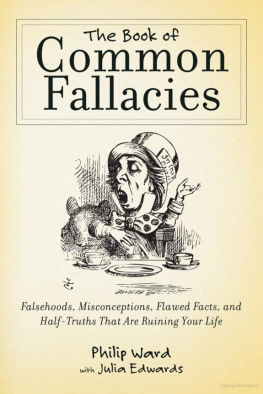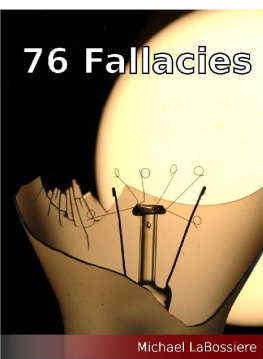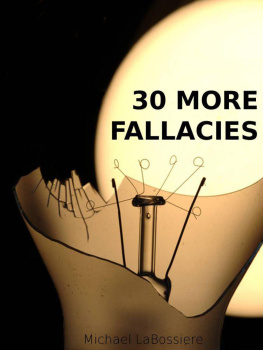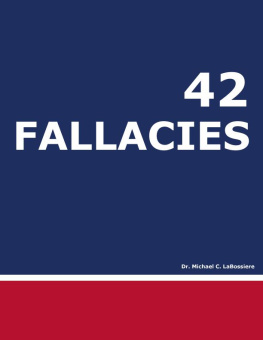Copyright 2011 by Chris Edwards. All rights reserved.
For information contact:
See Sharp Press
P.O. Box 1731
Tucson, AZ 85702
www.seesharppress.com
Edwards, Chris, 1977
Spiritual snake oil: fads & fallacies in pop culture / Chris Edwards ; introduction by Marie Alena Castle -- Tucscon, Ariz. : See Sharp Press, 2011. 146 p. ; 23 cm.
Includes index and bibliographical references.
ISBN1-884365-79-5 / 978-1-884365-79-9
Contents: Preface -- Why Debunk? -- Robert Pirsig and Philosophical Attacks on Science -- Michael Crichton and Intellectual Defense of the New Age -- The Celestine Fallacy -- The Secret Is Out (of its mind) -- Deepak Chopras Afterlife -- Francis Collins and Intellectual Christianity -- Dinesh DSouzas New Revelation -- Ray Kurzweil : The Singularity Isnt Even Close -- Simon Young and Transhumanism -- A Compendium of Fallacies.
1. Success -- Psychological aspects. 2. Self-actualization (Psychology).
3. Spiritual life in literature. 4. Christianity -- Essence, genius, nature.
158.1
Three of the chapters in this book were previously published in periodicals: Chapter appeared in Skeptic Vol. 16 No. 2 in 2011.
Cover design by Kay Sather. Interior design by Chaz Bufe.
C ONTENTS
For my children. May you grow up in a
world that is more critical of nonsense
than the one you were born into.
A CKNOWLEDGMENTS
I would like to thank Tom Flynn, editor of Free Inquiry, for his encouragement and for generously sharing his understanding of logic and geometry. I would also like to thank Michael Shermer, publisher/editor of Skeptic, the most public and effective advocate of skepticism, who published the article on Robert Pirsig which is the cornerstone of this book. Marie Castle, too, deserves thanks for being an early reader of Snake Oil and for her dedication to publishing a valuable and underappreciated freethought journal, The Moral Atheist. Finally, Id like to thank Chaz Bufe, my editor, for his advice on shaping this book and for ensuring that no words were wasted. Snake Oil would not have been possible without him.
I NTRODUCTION
by Marie Alena Castle
The selection pressures that drive evolution explain the development of all manner of physical and behavioral characteristics. But then theres the snake oil syndrome endemic to humansthe tendency to believe the most preposterous claims with no supportive foundation other than wishful thinking. What genetic-code pratfall brought that on? Homo sapiens might more accurately be called homo delusional.
Snake oil claims have one thing in common, a promise of freedom from any and all of the myriad miseries the human species is heir to, even death. No credible evidence is ever given, and you never have to do much to earn the rewards, but you almost always have to pay money to learn the secret, get the potion, make the pilgrimage, or invest in the cant-fail enterprise.
Why would we, the one species so much smarter than all the others, fall for this? Because, incongruous as it seems, we are smarter. We are a cognitively aware species of a very high order. We can see and understand, as no other species can, the dire straits nature has put us in. From the beginning, life was always (and still is for millions of people) nasty, brutish, and short. Our species has been desperate to change this. In fact, human history can almost be defined by our efforts to circumvent natures cruelty.
But human ingenuity could do only so much. It was left to imagination to make up for what ingenuity could not yet supply. Imagination, never constrained by reality, readily grasped at straws and called them lifeboats. Soon enough, there were those who learned how to turn what was fervently hoped for into a promise of fulfillment. All it took was an imaginary deity and an afterlife. Its called religion. And so it came to pass that a story went forth that once there was a Garden of Peace and Harmony, and now a way has been shown to get back to it. Many such stories followed. The sorrows of this life were as nothing compared to the eternal bliss in the Kingdom of Heaven that awaited the faithful. This was the origin of the various brands of religion, the various brands of snake oil.
It made sense in its own way. A line in one of G.K. Chestertons poems gives the logic: The yearning that His hand has wrought will not His hand fulfill? Sounds nice, but as logic goes, it could hardly be worse. Assuming there is an afterlife and a supernatural hand to fulfill anything doesnt make it true. What is logical, based on solid evidence, is that natural selection mindlessly produced the yearning, left it to us to figure out how to fulfill itor notand doesnt care one way or the other.
But religion was just the beginning. Today, as religions begin to lose their appeal, new types of hucksters are peddling new varieties of snake oil. The snake oil industry has become chameleon like. As one delusion fades another takes its place because the yearning never goes away. First religion, now New Age claptrapnext, fanciful science? Even though the conditions that madeand all too often still makelife nasty, brutish and short are less hideous now for most people in the industrialized world, we still readily succumb to our primordial yearnings. The Garden of Eden still beckons and the neon welcome signs are held up by gurus, shamans, soothsayers, and psychics beyond countingeven by a few spiritually desperate scientistsall promising mystical insights, curative potions, prosperity, immortality, and probably a cure for acne
As Harry Connick, Jr. put it in his song Imagination:
Imagination is crazy
Your whole perspective gets hazy
It starts you asking a daisy
What to do, what to do
Who among us, even among hard-core rationalists, hasnt looked down that path, hasnt had our perspective get hazy, hasnt imagined the sunny day of winning a multi-million dollar lottery and bought those snake oil tickets? But as far as fat-chance opportunities for a life of ease go, sucker-bet lotteries arent the worst. At least someone has a chance of winning other than the snake oil purveyors.
Chris Edwards is really, really tired of just rolling his eyes at this type of delusional behavior. He is on a mission to disabuse the populace of its obsession with the fraudulently fanciful. His first book, Disbelief 101: A Young Persons Guide to Atheism, took on the supernatural components of humanitys fantasyland. He demolished the fears that were its foundation and the beliefs that fed on those fears. He has written articles demolishing the factually bereft evidence for an afterlife that is so enthusiastically (and profitably) promoted by the likes of Deepak Chopra and Dinesh DSouza.
Now he is taking on New Age spirituality in all its flim-flam murkiness and pseudoscientific asininity. That spirituality is a reworking of religious fantasies, a curiouser and curiouser Wonderland where truth is whatever you want it to be and there is no objective reality. (There are no volunteers among New Age believers willing to step off a cliff to prove that the law of gravity has no objective reality. Too bad. It would help stop this nonsense if there were.)
In this gauzy New Age Wonderland of wishful thinking, ideas have more substance than things, which may or may not exist, depending on ones frame of mind. Spirituality is a highly valued mental condition, although its the intellectual equivalent of stiletto heels, attractive but not of much practical use.
New Age terminology is full of pseudoscientific terms, with quantum physics a favorite source, because of the ease with which its principles can be distorted into something mystical sounding. No matter. Since New Agers have no idea what quantum physics is all about, and hardly anyone else does either, it goes over, sounding scientific but degrading science to the same level as superstition.
Next page
